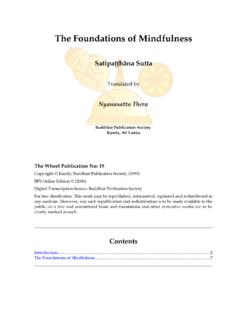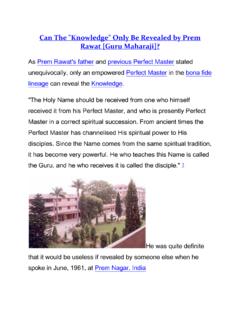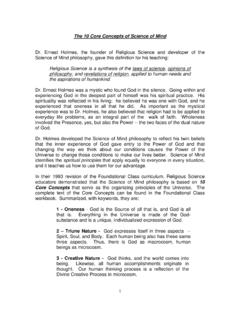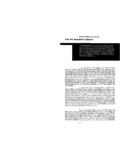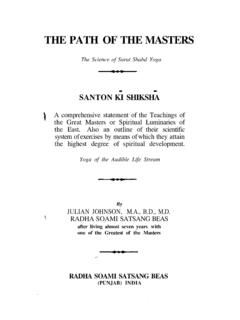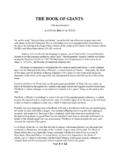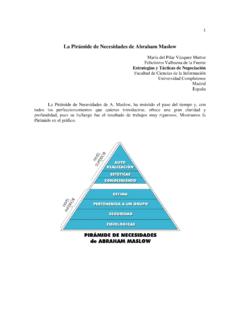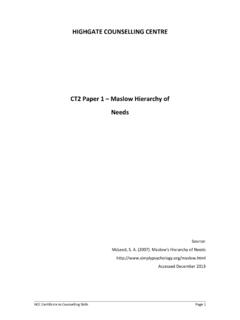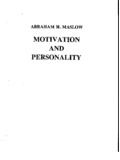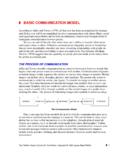Transcription of Religions, Values, and Peak Experiences
1 Religions, Values, and peak Experiences Abraham H. maslow Contents Editorial Introduction and Preface I. Introduction II. Dichotomized Science and Dichotomized religion III. The "Core-Religious" or "Transcendent" experience IV. Organizational Dangers to Transcendent Experiences V. Hope, Skepticism, and Man's Higher Nature VI. Science and the Religious Liberals and Non-Theists VII. value -Free Education? VIII. Conclusions APPENDIXES: A. Religious Aspects of peak Experiences B. The Third Psychology C.
2 Ethnocentric Phrasings of peak - Experiences D. What is the Validity of Knowledge Gained in peak - Experiences ? E. Preface to "New Knowledge in Human Values" F. Rhapsodic, Isomorphic Communications G. B-Values as Descriptions of Perception in peak - Experiences H. Naturalistic Reasons for Preferring Growth-Values Over Regression-Values Under Good Conditions I. An Example of B-Analysis Bibliography Religions, Values, and peak Experiences (c)1964 by Kappa Delta Pi and (c)1970 (preface) The Viking Press.
3 Published by Penguin Books Limited ISBN 0 14 8 NOTE: Religions, Values, and peak Experiences appears in under the "Fair Use" rulings regarding the 1976 Copyright Act for NON-profit academic, research, and general information purposes. Editorial Introduction The world has seen increased communication among political and economic philosophies, among the social sciences, among religions, among the physical sciences, and among people in general. Although there are individual differences in the cultural and material developments of the nations of the world, there has been a growing movement toward the establishment of a world philosophy in the social and physical sciences.
4 Concurrently with this growth of international communication and the unity it has brought about in the sciences, and the lesser amount of agreement it has engendered among political and social theorists, there has been a rising sentiment in favor of increased communication among, if not unity of, the religions of the world. Protestant groups have abandoned, or are abandoning, their strict sectarian views. The Ecumenical Council has brought changes that, although so far largely procedural, give promise of increased world co-operation between the Roman Catholic Church and other faiths.
5 And efforts have been and are being made to reconcile the views of the great religious leaders of all major religions-Jewish, Christian, Muslim, Buddhist, and Hindu-religions that, in the past, have been regarded by their followers as having been founded upon the direct revelation of a supreme being to a chosen earthly prophet. Traditionally, religion has been of the spirit; science, of the body; and there has been a wide philosophic gulf between the knowledge of body and the knowledge of spirit.
6 The natural sciences and religion have generally been considered as natural and eternal opponents. William James, through his psychology, especially his Varieties of Religious experience , and John Dewey, in his A Common Faith, have strongly influenced the views of Dr. maslow in this, the thirty-fifth volume in the "Kappa Delta Pi Lecture Series." Dissenting from the followers of those prophets who claimed direct revelation from God, and from the nineteenth-century scientists who denied not only direct revelation but God himself, the author declares that these revelations were, in his words, " peak - Experiences " which are characteristic not only of specially ordained emissaries of God but of mankind in general.
7 Dr. maslow considers these revelations valid psychological events worthy of scientific, rather than metaphysical, study-keys to a better understanding of a peculiarly "human" aspect of man's existence. This volume is presented as a contribution to philosophical and scientific thinking, as one interpretation of a fundamental aspect of life, as a step toward a better understanding among the religions of the world, and as a possible program for the development of a healthy relationship between modern science and modern theology.
8 E. I. F. Williams, Editor Preface Since this book was first written, there has been much turmoil in the world and, therefore, much to learn. Several of the lessons I have learned are relevant here, certainly in the sense that they are helpful supplements to the main thesis of the book. Or perhaps I should call them warnings about over-extreme, dangerous, and one-sided uses of this thesis. Of course, this is a standard hazard for thinkers who try to be holistic, integrative, and inclusive.
9 They learn inevitably that most people think atomistically, in terms of either-or, black-white, all in or all out, of mutual exclusiveness and separativeness. A good example of what I mean is the mother who gave her son two ties for his birthday. As he put on one of them to please her, she asked sadly, "And why do you hate the other tie?" I think I can best state my warning against polarization and dichotomizing by a historical approach. I see in the history of many organized religions a tendency to develop two extreme wings: the "mystical" and individual on the one hand, and the legalistic and organizational on the other.
10 The profoundly and authentically religious person integrates these trends easily and automatically. The forms, rituals, ceremonials, and verbal formulae in which he was reared remain for him experientially rooted, symbolically meaningful, archetypal, unitive. Such a person may go through the same motions and behaviors as his more numerous coreligionists, but he is never reduced to the behavioral, as most of them are. Most people lose or forget the subjectively religious experience , and redefine religion [1] as a set of habits, behaviors, dogmas, forms, which at the extreme becomes entirely legalistic and bureaucratic, conventional, empty, and in the truest meaning of the word, anti-religious.

